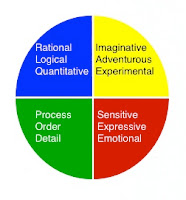 Our brains are amazing things. Even the worlds most advanced supercomputer, with the processing power of 1,000,000 desktop computers, wouldn't come close. IBM predict hat in 10 years time they could build a computer with the power to rival our human brain. Even if that were true it would still need the output of a nuclear power station to run it, substantially more than 3 shredded wheat!
Our brains are amazing things. Even the worlds most advanced supercomputer, with the processing power of 1,000,000 desktop computers, wouldn't come close. IBM predict hat in 10 years time they could build a computer with the power to rival our human brain. Even if that were true it would still need the output of a nuclear power station to run it, substantially more than 3 shredded wheat!That's because our brains have a few neat tricks up its sleeve. Keen photographers will be familiar with the RAW format, which contains far more data than the more commonly used JPG format. The brain does a similar thing. It takes the raw visual image and compresses it to reduce the amount of data, while preserving the key details.
And the image the brain receives is also subject to some power saving trickery. The common understanding is that the whole 'picture' is captured on our retina and then streamed to the brain. Some say that the brain progressively scans an image much like an up-scaling DVD player. Now it seems the brain uses something called predictive coding to speed up recognition. It works like predictive text on a mobile phone. The brain guesses what it thinks it's seeing and then then processes the detail to check and update the guess.
The brain is pretty clever then, but there's more. Our brain not only controls our thinking and perceptions, it also controls our behaviour and our emotions. The cerebral cortex takes care of all the logical rational thinking. However, beneath our rational brain sits the limbic system. This controls emotions and drives behaviour. It is the more instinctive and intuitive part of our brain and operates at a deeper level. Have you found yourself thinking that something doesn’t feel right, can’t put your finger on it, or put it into words? That’s your limbic brain at work.
It's easy to see why communication can be so problematic. With the billions of bits of data being processed, compressed and compared, it can be easy for it to be interpreted differently depending who is doing the processing. While everyone has a brain they are all wired up slightly differently.
 The Hermann Whole Brain Dominance Index (HBDI) is a great tool for understanding individuals communication preferences. These preferences drive behaviour and impact on all kinds of things from career choices to decision making and problem solving styles.
The Hermann Whole Brain Dominance Index (HBDI) is a great tool for understanding individuals communication preferences. These preferences drive behaviour and impact on all kinds of things from career choices to decision making and problem solving styles. I use a simple but powerful card game in leadership and team development programmes to show people how their own thinking style impacts on communication and behaviour. It’s also a good introduction to the psychometric profile you can complete. If you like to know more about how HBDI can be used, drop me a line.
No comments:
Post a Comment